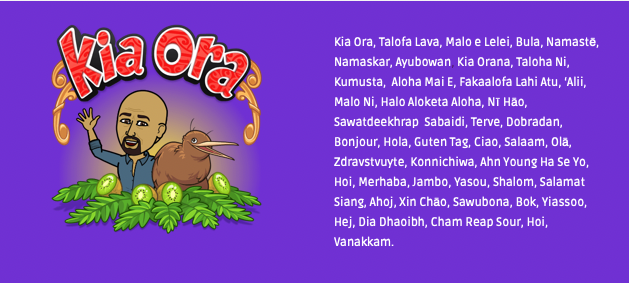Principal's Page

Kia Ora Friends - a Look at Our Structured Approach to Play-Based Learning
Play-Based Learning:
We have conducted extensive research into the value and importance of this approach – particularly in our junior school.
Our Kahui Ako - our community of 12 local schools - invited Nathan Mikaere Wallis to come and speak to our parent community about Social-Emotional Learning, Brain development in children through to teenagers, touching on Play-Based Learning. His presentation was completely sold out – huge interest from our community and very evident support amongst the community and staff for his findings and advice.
Over several years, we have observed a consistent pattern with our new-entrant children, particularly our new-entrant boys. Many are totally unready for formal school. Many are not socialised, inattentive in learning situations and lacking in oral language skills. They are not ready, but they are expected to be. We pass no judgement about this situation. Instead, we welcome every child for who they are and as they are, seeking to take them from where they are to their next step in learning. That is social-emotional learning first, and academic learning following and alongside that.
Research showed us the following:
A 2006 study showed increased problems in reading caused by starting children too early. Evidence, for example, is that eye formation, in boys in particular, is not yet fully developed and that the risk of dyslexia is thus increased.
That study also showed that reading for pleasure outweighed every social advantage, including a parent's income, in the child's future success. It showed too that children in this country scored low on this indicator. It indicates we should concentrate less on whether a child can read and more on whether or not they like it.
Forced reading:
Seems more like memorisation in babies and toddlers
Causes children to get easily discouraged
Seems more like a chore instead of a fun, leisure activity
Doesn't guarantee an edge in the classroom
The age a child starts reading doesn't necessarily predict how they will do later on. Studies have found no long-lasting advantage for students who learn to read early. In fact, children who learn to read later than others usually catch up so quickly once they start that within a few years, there's no discernible difference in ability between them and early readers.
A University of Otago researcher has uncovered for the first time quantitative evidence that teaching children to read from age five is not likely to make that child any more successful at reading than a child who learns reading later, from age seven.
The ground-breaking Psychology PhD research conducted by Dr Sebastian Suggate has seen him awarded a prestigious Postdoctoral Research Fellowship from the Humboldt Association in Germany to the University of Wurzburg in Bavaria to further his studies into childhood education.
Comparing children from Rudolf Steiner schools, who usually start learning to read from age seven, and children in state-run schools, who start learning to read at five, he found that the later learners caught up and matched the reading abilities of their earlier-reading counterparts within a couple of years. The data from Finland matches this. They start with a play-based curriculum for the first two years; teaching reading starts at age 7. Within, on average, two years, their children have caught up to where our children who started at age five have progressed to. From that point onwards, Finnish children surpass ours every year.
Dr Suggate, in three years of studies involving regular surveys of around 400 New Zealand children, found no statistical evidence of an advantage in reading from the earlier age of five.
“One theory for the finding that an earlier beginning does not lead to a later advantage is that the most important early factors for later reading achievement, for most children, are language and learning experiences that are gained without formal reading instruction,” says Dr Suggate.
“Because later starters at reading are still learning through play, language, and interactions with adults, their long-term learning is not disadvantaged. Instead, these activities prepare the child well for later development of reading.”
Paediatricians and educationalists are now convinced, more than ever, that play is an essential part of a child’s development as a whole person. It is an important element in the happiness and well-being of every child. Numerous research studies have born this out and also advocated by great educationalists such as Maria Montessori and Jean Piaget.
It is crucial that child playtime is not reduced in the kindergarten or pre-school stages and also not overwhelmed by screen time or early academic training. Let the children play and learn!
“Play is often talked about as a relief from serious learning. But for children, play is serious learning. Play is really the work of childhood.” – Fred Rogers.
Forcing children to read and write before they are ready often makes them resentful and combative. Children need to socialise and advance at their own pace.
“There is no evidence that such early instruction has lasting benefits and considerable evidence that it can do lasting harm. If we do not wake up to the potential danger of these harmful practices, we may do serious damage to a large segment of the next generation...” (David Elkind, Miseducation: Preschoolers at Risk (New York: Knopf, 1997): 4, as quoted in Olsen, 2005).
“There is a large body of evidence indicating that there is little, if anything, to be gained by exposing middle-class children to early education. Those who argue in favour of universal preschool education ignore evidence that indicates early schooling is inappropriate for many four-year-olds and that it may even be harmful to their development.” (Edward Ziglar, co-founder of Head Start and director of the Bush Center in Child Development and Social Policy at Yale University, Formal Schooling for Four-Year-Olds? No”. Yale University Press, 1987, as quoted in Olsen, 2005)
Research shows those children who learn to read and write early will be:
* Caught up to within a year or two
* Less creative
* Less engaged in their learning
* Less enthusiastic about school
* Less confident about themselves and their learning
* More susceptible to anxiety - especially in their teenage years
* More prone to suicidal thoughts and tendencies
* Earn less than their peers from age 30 onwards
* Much more likely to get into trouble with the law or be incarcerated
* More likely to be unemployed
So why would we do this if we know this is the outcome?
The answer is we are not going to fall into that trap of pushing children too far too soon.
And we are not alone - Ministry Officials I spoke to in South Korea realised they had made a huge mistake in their drive to achieve the highest Reading, Writing and Maths standards in the world through direct instruction, 'drill-and-kill' and massive learning loads.
Kids passed the tests but hated school, hated learning and lacked the Social Emotional skills the world desperately needs.
Emphasising Social-Emotional learning and Play-Based learning is not an easier path.
It requires far more engagement, planning, resourcing and interaction - but it is worth it.
Children learn best when engaged in activities geared to their developmental levels, prior experiences, and current needs. As they construct their ideas through play and hands-on activities that make sense to them, children’s knowledge builds in a gradual progression that is solid and unshakable. They build a foundation of meaning that provides the basis for understanding concepts in language, literacy, math, science and the arts. In active learning, their capacities for language development, social and emotional awareness, problem-solving, self-regulation, creativity, and original thinking develop, transforming them into effective learners.
This sums it up for us. As parents, we did not have anyone coming around saying, oh, look, your child is one year old, and they are not walking yet. We knew with patience and support; they would get there. We need to have the same attitude with reading, writing and maths.
We are not going to push our little ones towards false targets and damaging achievement goals. We are going to focus on social-emotional learning by building the best and strongest relationships. We are growing resilient, confident and creative kids and building learners for life.
As always - if you have questions or concerns about anything school-related - email me at macash@mac.com, and I will get back to you asap.
My very best regards to you all,
Ash Maindonald
Principal.

